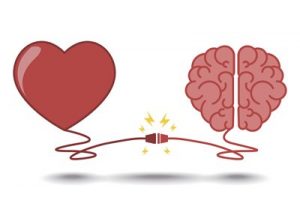A Strong Heart and a Healthy Brain
by Michael D. Allen, DC, NMD
Functional Neurologist
Did you know that many of the same basic factors that prevent heart attack and stroke may also prevent or delay the onset of cognitive impairment and dementia?
Since both the heart and brain need adequate blood flow, many of the same things people do to maintain a healthy heart, like exercising, eating well and avoiding cigarettes, can also help protect the brain from cognitive decline and dementia, according to a health advisory recently published by both the American Heart Association and the American Stroke Association.
Most people know the importance of keeping their blood pressure and blood sugar within safe levels, and that omega-3 oils have been shown to help maintain a healthy cardiovascular system. But that’s not where it stops.
Although elevated blood pressure, cholesterol, and blood sugar can be managed with medications, the advisory stresses that the largest benefit to brain health and cognitive function may not always be found in pills.
In his first book, What Your Brain Might Say if It Could Speak, Dr. Michael Allen, Functional Neurologist and founder of HealthBuilderS® and co-founder of the Institute for HealthBuilderS® states that, “Nutrition can only go so far in building a strong and healthy brain. We must also encourage the essential connections between the brain and the muscles that stimulate it, and reinforce the outgoing brain signals that control how the body works.”
Dr. Allen teaches that the highest priority brain input comes from the muscles, and especially those of the centerline spine. He says, “When spinal muscles work according to their original design not only is the spine strong but the spine’s efficiency also keeps the brain stimulated to its highest level. The brain controls all body function, but it only influences the heart. However, when the spinal muscles lose their tone, the brain starts to go and heart decline follows.”
Symptoms of weakened spinal muscles include limitations in limb movement, a reduction in tendon reflexes, fasciculations (often a benign muscle twitch; a small, local, involuntary muscle contraction and relaxation which may be visible under the skin), tremors, swallowing and feeding difficulties, and impaired breathing. Some children also develop scoliosis (curvature of the spine) or other skeletal abnormalities.
Dr. Allen’s practice specializes in the functional neurological aspects of established human movement patterns. His neurology tests are non-invasive and can elicit abnormal muscle function common to overtraining, nutrient deficiencies and structural problems. Once found, he works to re-establish and rehabilitate the optimal neurological connections that reinforce normal movement.
As a result of his over 40 years of experience, Dr. Allen has helped thousands of people, and taught hundreds of doctors on four different continents the secrets of a successful clinical practice.



